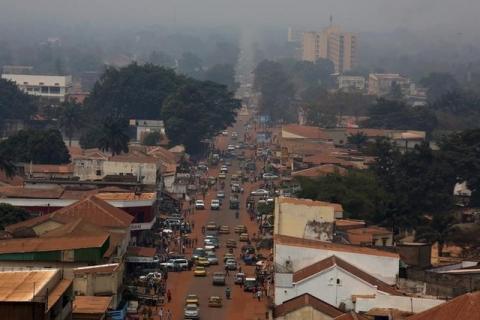Advertisement
Three killed in anti-U.N. unrest in Central African Republic: Red Cross
BANGUI (Reuters) - Three people were killed and six wounded in Central African Republic on Monday when U.N. peacekeepers exchanged fire with armed men during a protest against the U.N. military presence, the local Red Cross said.
The dead and wounded were among hundreds of protesters gathered to call for the U.N. troops to leave the country, Antoine Mbao-Bogo, president of the CAR Red Cross, said. A U.N. spokesman said at least four peacekeepers had been wounded.
A Reuters witness saw protesters, carrying anti-U.N. posters, throwing stones and shouting at the troops who responded with warning shots. There was then an exchange of gunfire between the troops and armed men near the crowd.
U.N. spokesman Stephane Dujarric told reporters in New York that government security forces and U.N. peacekeepers had been deployed to contain the demonstration which happened as most of the city's 1 million people observed a one-day general strike.
Central African Republic has been in chaos since early 2013 when fighting between mostly Muslim Seleka rebels and anti-Balaka Christian militias prompted the establishment of the U.N. mission MINUSCA a year later.
MINUSCA has been dogged by dozens of allegations of sexual abuse, prompting a broad U.N. inquiry. Chadian troops within the mission were accused in 2014 of killing 30 civilians in a crowded market, prompting the withdrawal of that contingent.
Criticism of the 13,000-strong mission has mounted in recent weeks with local people accusing the peacekeepers of not doing enough to protect them.
"We have seen that their mission has no use and it's just better that they leave," said IT engineer Didier Fabrice Balandegue as gunfire rang out in the background.
Civil society groups launched a petition last week calling for MINUSCA's departure and the re-arming of the national armed forces, currently subject to a weapons embargo.
Government spokesman Theodore Jousseau blamed the violence on politicians trying to destabilise the administration.
"These are embittered politicians who hide behind civil society to manipulate the population," he said.
This month, 30 people were killed and dozens wounded during an attack on refugees by Seleka forces, although violence in the capital in recent months has been rare.
(Reporting by Crispin Dembassa-Kete and Serge Leger Kokopakpa; Additional reporting by Michelle Nichols in New York; Writing by Emma Farge and Aaron Ross; Editing by Robin Pomeroy)



















Add new comment